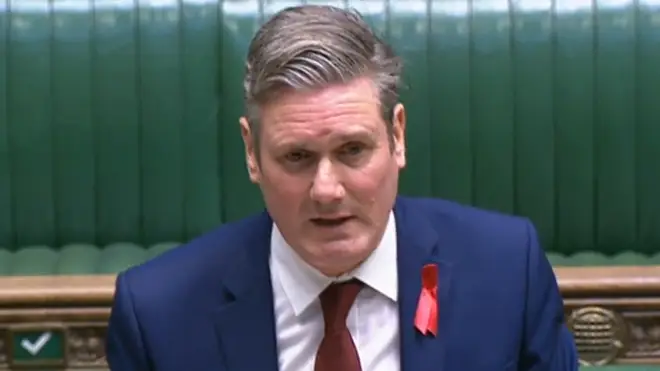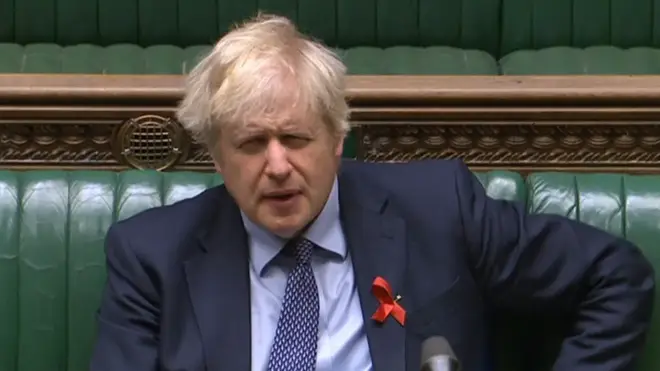
Simon Marks 3pm - 7pm
1 December 2020, 15:00

Boris Johnson's Covid-19 strategy poses a "significant" health risk and is "highly unlikely" to see restrictions eased in parts of the country before Christmas, Sir Keir Starmer has claimed.
The Labour leader accused the Prime Minister of "over-promising and under-delivering" by pursuing an approach of short-term decisions that then "bump into the harsh reality of the virus".
His party plans to abstain on the vote on the new three-tier system of restrictions to be introduced from Wednesday after England's second lockdown ends.
Speaking in the Commons, Sir Keir told MPs: "We're now on at least the fifth (plan) - with an even bigger promise that never materialises.
"After eight months, the Prime Minister should not be surprised that we and many of the British people are far less convinced this time round."
He added: "The public health risk of the Prime Minister's approach is significant.
"The prevalence of the virus remains high - even if the R rate is below 1 it's only just below 1 - and we know the virus is at its most deadly during the cold winter months, exactly when the NHS is under the most strain."

Sir Keir warned that "precision and caution" are needed to ensure progress made in the second lockdown is not wasted.
He accused the Prime Minister of failing to "level" with the British public and said he had been "fuelling a promise that within two weeks or so local areas have a real prospect of dropping to a tier below the one they're in".
Read more: Scotch egg starter? Ministers make 'substantial meal' of coronavirus pub rules
Read more: Boris Johnson promises £1,000 one-off payment to pubs that do not serve food
Sir Keir went on: "We need to level - in my view, that is highly unlikely and we might as well face that now. It's obvious that the new Tier 1 may slow but won't prevent a rise in infections, it's far from certain that the new Tier 2 can hold the rate of infection.
"I hear the mutterings, but let's just see where we are in two weeks. I look across to members in the House who think that perhaps in two weeks their area will have dropped down a tier just before Christmas. Let's see."
One Conservative MP muttered Sir Keir was demonstrating "hindsight", to which the Labour leader replied: "This isn't hindsight. I'm telling you what's going to happen in two weeks.
"We know where we'll be in two weeks, and I've no doubt there will be (Conservative MPs) getting up and saying, 'I thought my area was going to drop a tier just before Christmas'.
"That's not levelling, that's not being straight, because that's not going to happen.
"I hope I stand here and I'm wrong about this, and I think all members hope I'm wrong."

Cabinet meet ahead of Commons Covid tier vote
Sir Keir described the tiering system as "unfair" and called for greater financial assistance.
Mr Johnson earlier claimed Labour had "no credible plan" to tackle Covid-19, telling MPs: "We're trying to look after pubs, restaurants, businesses across this entire country and no-one feels the anguish of those businesses more than this Government.
"I do think however it is extraordinary that in spite of the barrage of criticism that we have, we have no credible plan from the party opposite, indeed we have no view on the way ahead.
"It's a quite extraordinary thing that tonight, to the best of my knowledge, (Sir Keir) who said he's always going to act in the national interest, has told his party to sit on its hands and to abstain in the vote tonight."
Mr Johnson insisted the Government will look at how the restrictions can reflect "as closely as possible the reality of what is happening on the ground", in a nod towards localising the restrictions further.
Conservative opposition to Mr Johnson's plans was evident from the start of the six-hour debate, with Sir Graham Brady announcing he had been left with "no choice" but to oppose the Covid-19 regulations.
The influential chairman of the Tory backbench 1922 Committee said: "If Government is to take away fundamental liberties of the people whom we represent, they must demonstrate beyond question that they're acting in a way that is both proportionate and absolutely necessary.
"Today, I believe the Government has failed to make that compelling case."